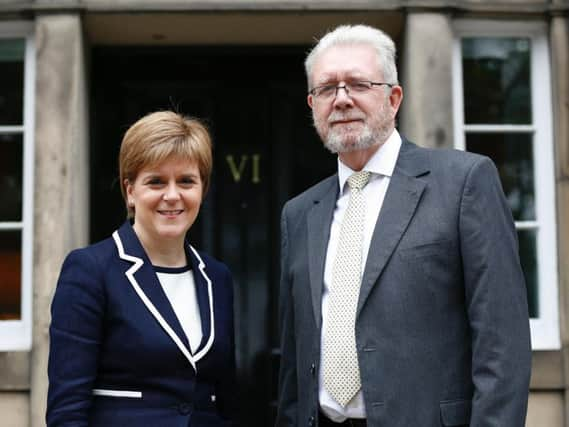SNP can't spin its way out of life and death issues – Brian Wilson


It must have seemed an easy hit for Michael Russell, our grandly titled Constitutional Relations Secretary. Sunday morning radio, blah-blah-blah, headlines tomorrow.
So we had Mr Russell informing the anxious nation that a no-deal Brexit would “result in businesses closing down ... problems in the food chain ... problems with the supply of essential medicines”.
Advertisement
Hide AdAdvertisement
Hide AdMr Russell expanded the point, saying “drug companies very, very reluctant to be involved ... very, very problematic ... very difficult if not impossible” to guarantee security of medical supplies. Headlines, headlines, headlines.
The first thought is that if such a dire threat exists, might it not be the duty of the Health Secretary in the Scottish Government to appraise the public, in rather more measured tones?
Unusually, an extremely effective voice of rebuttal was on hand – no less a personage than the President of the Royal Pharmaceutical Society, Ash Soni – with a magisterial put-down on Good Morning Scotland.
Dismissing Mr Russell’s claims, he added: “Trying to scare the public is not a great thing to be doing at this time ... What we don’t need is patients starting to stockpile because that itself will create a shortage in the market.”
This point is so obvious that one might have expected it to curb even Mr Russell’s instincts. Where I live, if ferries are off for a couple of days, the Tesco shelves are emptied just in case things get worse.
Extrapolate that to the “very, very problematic” challenge of supplying drugs on which people’s lives may depend and we are into territory of Grade A Irresponsibility for which Mr Russell should apologise and desist.
But let’s also follow through the logic of what he said. If he truly believes in the dire consequences of a no-deal Brexit, including potential for the medical supply chain failing, then why has his party resolutely opposed the one certain means of preventing it?
The same question applies, of course, to other opposition parties and will arise again in the coming weeks. To me, it is the great under-asked question of the whole Brexit fiasco. If no-deal is so unthinkable (as it should be), then why have you been so contemptuous of the deal that was and is available?
Advertisement
Hide AdAdvertisement
Hide AdIf businesses, jobs and even human life are at risk from no-deal, at what point does it become morally as well as politically reprehensible to reject the one sure way of avoiding it? There may be a satisfactory answer but I have never heard it – largely because the question is never put to those who, like Mr Russell, love to pontificate but ultimately to avoid hard choices.
The deal the EU and UK agreed is not perfect but it is ludicrous for anyone starting from a “remain or if we can’t remain stay as close as possible” position to reject it when the brutal alternative may well be the “no deal” exit they supposedly abhor.
As the week wore on, an unmistakable matter of life and death emerged through Scotland’s awful drug statistics. If ever there was a case for politicians working together to tackle a social blight, surely this is it. Any chance?
Only a fool attributes this tragedy to a single government or party. The causes are rooted deep in poverty, poverty of expectation, the weird Scottish attachment to excess, failure to tackle inter-generational mayhem through early intervention ... Take your pick.
Equally, any government in office for 12 years must accept responsibility, without deflection, for what happened on its watch. Why did it take passing a meaningless 1,000 drug-death landmark for an “emergency” to be recognised?
Why are there continuing cuts to vital support services? There are a lot of “whys”?
Wretchedly, the Scottish Government deployed a strategy to create an argument about powers, concentrating on one relatively narrow issue – which in no way explains the fact that Scotland’s drug deaths are three times higher than the UK’s as a whole.
Sometimes in politics, there is a need to grow up and recognise that where life and death are involved, there really is a time to stop spinning and start acting – perhaps even in silence.